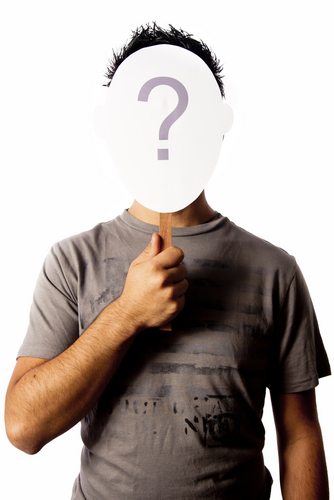Who are you?
This is a serious question. I want to you to think about who you are. How would you describe yourself? Can you describe yourself in three words or less or do you need more? Are you a geek? A nerd? A gamer? An otaku? Are you a writer? A photographer? An accountant? A lawyer? An cubicle drone? A parent? A lover? A football fan?

I want you to take your time and think about it, because those words you use to describe yourself are a big part of your identity. And your identity can be a powerful thing – more powerful than you might realize. You see, our identity is more than a convenient way of summing ourselves up: it’s how we present ourselves to the world. It controls how we interact with the people around us, how we see ourselves and how others react to us.
Your identity can be a powerful tool in getting better at dating… or it can be the thing that’s holding you back.
What Is Identity?
At it’s core, identity is how we define ourselves. It’s the culmination of our interests and our values, what we do and what we love and – critically – how we see ourselves and what gives us validation.
Sometimes our identity is simple, a way of labeling yourself that sums you up: you are an X, Y or Z. It creates a sort of short-hand stand-in for our sense of self. When we think of ourselves, we don’t form a complete picture, complete in every detail; we imagine a rough sketch, focusing on major details while glossing over others. In many ways, our self-concept is a cartoon version of us – an abstraction with details that we consider to make us uniquely ourselves. For example: if you wear glasses, they will tend to form a larger part of your self-concept because you’re more aware of them. At the same time, your eye color or the shape of your face doesn’t typically form part of your mental image unless you have reason to think about them specifically – they are part of the general abstraction.
This is why we so often tend to fall back on archetypes as part of our identity – they provide a general sense of who we are, touching on the major details while letting the stereotype fill in the blanks. Just as there are parts of ourselves that feature more prominently in our self-image, the parts of ourselves that are more important stand out in our identity. Someone who identifies him or herself as a parent, for example, values their relationship with their child; part of their sense of self-worth and validation comes from raising their son or daughter and being as good of a parent to them as they can be. Someone who identifies themselves by their profession is defining their value by their job. They may believe that their job is important – a doctor who saves lives, a scientist who develops important new technologies, a computer engineer who revolutionizes the way we interact with the world around us. They may believe that their worth is defined by being financially successful. Or they may see themselves as a cog in a massive machine, another face in a red jumpsuit trudging along in the name of corporate profits.
In many ways, our identity is also part of who we identify with. Many people identify themselves by their interests and – by extension – identify themselves as part of the community that shares their interests When you identify as a geek, or an otaku or a gamer or a Miami Heat fan, for example, you are defining yourself not just by your interests but by putting yourself in alignment with others who also name themselves geeks, or otaku or gamers.

When you say “I’m a geek” for example, you’re saying that at least part of your identity is made up by the popular stereotype of geeks – a love of pop-culture (especially sci-fi/fantasy) and gadgets, a passion for collecting and a tendency to. That collective identity goes both ways too; when people talk about geeks as a whole, an individual geek may take offense. This is, incidentally, part of the reason why so many gamers went up in arms over Anita Sarkeesian’s Tropes Vs. Women video project; because they identify as gamers, they feel that they’ve been attacked personally when she criticizes tropes in gaming culture.
In many ways, your identity is your personal brand. Just as an Apple product means a simplified user interface and a slick industrial design or Xbox tends to mean first-person shooters and hardcore gamers while Nintendo means 3rd person character driven platformers and adventure games, your identity is part of how you present yourself to the world.
It also defines how you interact with the world.
Your Identity Is A Filter
The way you see yourself directly affects the way that you perceive the world around you; everything is filtered through the prism of your identity, from the way you interact to other people to the way that you think.
To give an example: last week I was having dinner with two friends of mine – Bert, a working actor and Leah, a visual artist. We were discussing what it takes to craft a role and the difficulties that the next person would have trying to play the Joker; after all, they weren’t just having to compete with Heath Ledger’s portrayal but also Jack Nicholson’s, Caesar Romero’s and Mark Hamill’s. As we talked about the various aspects of the character, it soon became obvious that we were all perceiving it differently. My take was based on how I would create him, focusing on the outward concept and narrowing down the details, the way I would create characters for a novel. Bert focused on getting into the mind of the character and how to become him as much as possible while the Leah described him in visual terms, talking about his energy and the way he would take up space and fill a room. Our approaches to the idea of The Joker were extensions of our identity because it was how we viewed the world; I tend to look towards narrative and characters while Leah is more visually oriented and Bert is more transformative.
Anyone who’s spent time in the Pick-Up Artist community may notice something similar: when you identify as a PUA, you tend to see everything in terms of pick-up. A woman isn’t just making a joke or expressing doubt about something you said, she’s shit-testing you to see whether you’re congruent with your identity and whether you’re going to give in to her. She’s not just uninterested in talking to you, she’s put up her bitch-shield. The guy talking to you at the bar isn’t just being friendly when he pats you on the arm or chucks you on the shoulder, he’s trying to out-alpha you. The world gets filled with Average Frustrated Chumps who meander their way through life and PUAs who “see the Matrix” and can read social dynamics in a glance.

The way you identify yourself changes the context of everything. When I saw myself as the One Who Wasn’t Good With Girls, it colored every interaction I had. I missed out on women blatantly hitting on me because I couldn’t possibly believe that they could possibly want me; clearly I was misunderstanding. I would read entire volumes into every minute gesture; every unanswered text or instant message was a sign that she was avoiding me, rather than she couldn’t get to her phone or was otherwise occupied. I lived in the constant expectation of getting rejected or getting dumped, and every “Let’s Just Be Friends” speech was further confirmation that women just didn’t like me.
Similarly, people who see themselves as being lucky tend to have a happier outlook on life. Just as the negative associations of my identity caused me to filter out signs that women liked me, people who believe they’re lucky tend to focus on the positive. By being on the look out for opportunity, they maximize their odds when it does arrive.
Identity Affects How Others See You
Remember how I said that your identity is your personal brand? That brand can work for you… it can work against you.
There was a famous psychological study in the ’60s about the power of labels. A group of students were given a series of tests and were divided into two groups: ones who were labeled as “gifted” or “academic bloomers” and “normal kids”. They were put into different classes and the teachers were informed whether their students were “gifted” or “average”. In reality, the labels were actually completely arbitrary and assigned to each child at random… but at the end of the year, the children who were labeled as “gifted” outperformed the students who were labeled as “normal”. The difference was in how the teachers responded to the students based on the label.
Tell somebody that a person is a nerd and they will respond to that person differently than if you tell them that they were popular guy at school; both of those identities carry different expectations and they will color people’s perceptions.

This applies even to the labels you give yourself, consciously or unconsciously.
Your identity is how you’re defined and those definitions affect how others see you. If your life is defined by being self-loathing or having a negative outlook on life, when you shuck personal responsibility and are busy blaming others – women for rejecting you or men for stealing them – for your lack of success then no matter what you do, your negative self-identity is going to make others see you as unattractive. When I was The One Who Wasn’t Good With Girls, it showed in everything I did. I was bitter, I was entitled and I was positively quivering with resentment… really, it’s amazing that I didn’t have to beat women off with a stick. Even if I said something funny or flirted with someone, there was an underlying tone of bitternes that would undermine everything I said. I had internalized my unworthiness and undatability as part of my identity and it radiated from me like a miasma. I was defining myself solely by the number of women I had slept with (and the ones I hadn’t) and it was toxic.
I didn’t have to tell people I was The One Who Wasn’t Good With Girls; they could see that label as clearly as if it were tattooed on my forehead.
People who are confident, who are define themselves by having diverse interests and friends, whose value isn’t solely determined by the amount of money they make or the people they date… they have more success in their personal lives. Why? Because their identities are fundamentally positive; they don’t project neediness the way someone who relies on external validation does. As a result: people prefer to be around them. They’re more attractive. They’re more fun. Their identity, their labels of “cool” or “fun” or “self-assured” attracts others into their lives and inspires them to stick around.
The Beauty of the Authentic Self
Remember when I asked you to think about who you are? I want you to think about it again. What is it about you that defines who you are? Where do you derive your value and what do you have going for you in your life?
Sometimes the answer is long and complex. Sometimes the answer is “not much”… and that’s ok. The thing about identities is that they can change. You can grow. You can improve. You can be better.
It’s not always easy. The process of changing my identity was long and frankly rather difficult. I had to unlearn a lot of beliefs I had internalized, change how I defined my self-worth. And it was a bumpy road. When I was in the pick-up community, I still was seeking external validation; the only difference is this time I was better at getting laid in the short term. In the long term… well, there’s a reason my relationships didn’t really last. If I wasn’t out racking up new sex partners then it meant that I was stagnating. If I had a night that didn’t go well, it could be a devastating blow to my sense of self because I still overvalued sex. I lived with the all-too common fear that I was a fraud, that none of this was real and it could all disappear on me… and then who would I be? I feared being like the jock who peaked in high-school, whose identity was based around being the big man on campus and now only lived for the memory of those glory days.
I’d made a classic mistake: I was too focused on getting laid and not on being a better person. I was adopting more positive, attractive behaviors without any authenticity behind them. It was a temporary fix at best; the gains were ephemeral and I was almost always back to where I started.
It was only through genuine self-improvement that I was going to become more attractive. I had to find my authentic self, my real identity.
When I learned not to define myself by who I was or wasn’t dating or how many people I’d slept with, life started to get better for me; my sense of value and self-esteem was no longer based on this one external factor any longer. I had more to me, more to my identity, than just whether or not a girl liked me. I was willing to accept and acknowledge my faults but not let myself be defined by them. I became happier with who I was and lost that fear that it could all vanish on me overnight. I have friends who loved me, I have my writing, I have my travels. I have my hobbies, my books, my comics… all of these little things that make me happy and who I am today. Sometimes things change – a podcast I was part of came to an unexpected end, for example – and while that can suck, it doesn’t destroy me or fundamentally alter my identity.
Find the things that make you happy, that bring you comfort and make you feel good about yourself. These are what will help you learn how to become the person you envision yourself being, the person you want to be.






